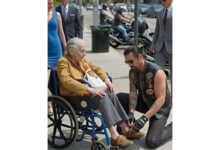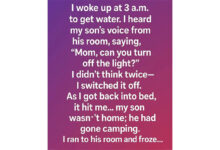SHE WALKED SIX BLOCKS WITH A ROLLATOR, JUST TO BRING HER NEIGHBOR SOME SOUP
Just before 5 p.m., I spotted her inching down the sidewalk, her rollator’s wheels squeaking with every deliberate step. Two grocery bags swung from the handles—one held a loaf of bread and a few cans, the other was wrapped in a towel, radiating warmth. She didn’t notice me watching from across the street; her gaze was fixed ahead, determined as if this short walk were the most important journey of her life.
I’d met Miss Inez before—she lived three doors down, curtains always open, greeting the mailman like an honored guest. But today she seemed tired, her breathing labored. Still, she pressed on, unflinching. When I finally crossed over and offered help, she waved me off. “I’m fine,” she said softly. “Just bringing some hot soup to the Mitchell boy. His mama’s been in the hospital, and he’s been alone for three nights now.”
I noticed a taped-up note atop the container, her handwriting shaky but clear: You matter. She adjusted her load and kept going. I walked beside her, offering an arm when she paused to catch her breath—not from weakness but to conserve energy for delivering hope.
About ten minutes later we arrived at the Mitchells’ peeling-wood house, curtains drawn, driveway empty. Miss Inez tapped twice on the door, and it cracked open to reveal a boy of twelve or so, his eyes heavy with worry. “Evening, sweetheart,” she said, voice gentle. “I brought you supper.” He stared at the bag as though it might vanish, then whispered, “Mama’s still at the hospital. They’re not sure yet.” She nodded and tapped the note: “Remember someone’s thinking about you.”
As we turned to leave, he called, “Thank you.” And just as we stepped off the porch, he added, “Nobody’s knocked on our door in three days.” Those words hit me harder than the chill in the air.
On the slow walk back, I offered to carry her walker. She smiled and said, “People think little things don’t matter. But a warm meal and a few kind words remind someone they still belong.”
By the end of the week, the Mitchell boy’s mother was home, and neighbors began dropping off casseroles, comics, even a handwritten card signed by three families. Yet the note—You matter—was what he taped to the fridge first.
Months later, when Miss Inez herself needed help after a fall, the first to arrive each morning was that same boy, carrying bags instead of receiving them, a bright smile where once there had been fear.
Six blocks. A rollator. A bowl of soup wrapped in a towel. And a simple message: You aren’t invisible. You’re not alone. You still matter.

